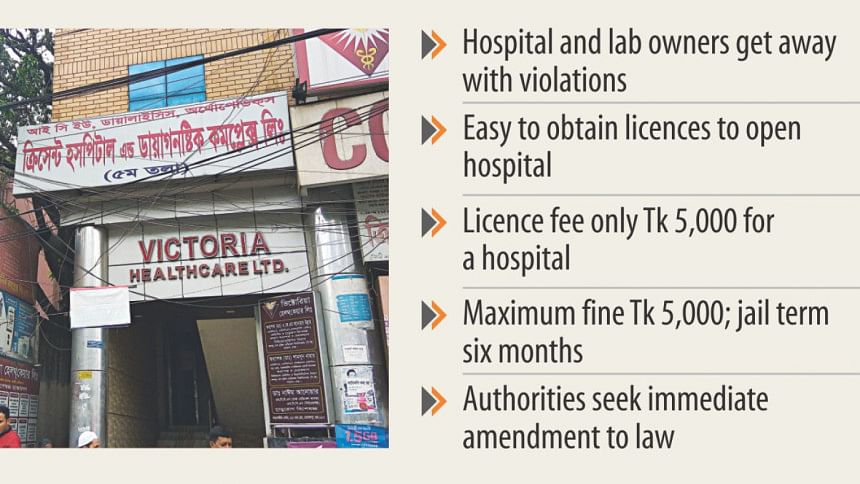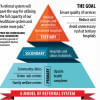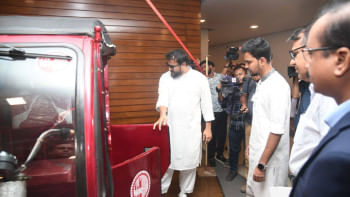Hospitals with Poor Service: No escape from errant owners

Sahanara had brought her daughter Samia Akhter Sumaiya, 6, to Dhaka for treatment at the Nitor, commonly known as Pongu hospital.
As soon as she reached the public hospital at Sher-e-Bangla Nagar, a broker lured her to Crescent Hospital and Diagnostic Complex Limited in Mohammadpur, promising better treatment at a cheaper cost.
But once she admitted her daughter there, the hospital authorities started pressuring her for an amount she could not afford.
Sahanara, who came from Gopalganj, eventually went to Executive Magistrate Sarwoer Alam and lodged a complaint in the middle of March.
On March 28, a team of Rab, along with officials of the Directorate General of Health Services (DGHS), raided the hospital.
What the team found was appalling.
A patient lay on the operating table with no one attending him. One of his legs was injured in a road accident the day before. His blood pooled on almost the entire floor. He had been left unattended for more than 24 hours.
He died the next day at Dhaka Medical College Hospital (DMCH) due to excessive bleeding.
During the raid, all the patients complained that they had been lured by brokers to the hospital from National Institute of Traumatology and Orthopaedic Rehabilitation (Nitor).
They were mostly farmers, auto-rickshaw drivers and fishermen from outside Dhaka.
After admission, the hospital authorities began demanding more money from them.
Meanwhile, upon Rab's request, Labaid Specialised Hospital admitted Sumaiya and treated her for two weeks before sending her to Nitor.
Licence documents obtained by The Daily Star show Crescent's owner Abul Hossain was also one of the three owners of Macca Madina General Hospital, another facility where gross violations were found during a drive on November 29 last year.
Patients in Macca had also been enticed to come from Nitor, with promises of prompt treatment with no hassle and at a lower cost. The brokers told them that it was a branch of Nitor.
One of two other owners of Macca was Abul's brother Nur Nabi, who used to oversee the operations of Crescent.
LAWS TOO LENIENT
When The Daily Star reached out to Nur Nabi by phone, he rejected the findings uncovered during the raid.
“Like other private hospitals, we have marketing teams [in Macca and Crescent]. It is up to them to get patients from the DMCH [Dhaka Medical College Hospital] or somewhere else.”
Asked why any punitive action had not been taken against Crescent, Dewan Md Mehedi Hasan, medical officer of the DGHS, said the authority could only issue a show-cause notice or cancel the licence under the medical practice and private clinic and laboratories (regulation) ordinance, 1982.
Following a show-cause notice after inspection, hospital authorities usually give explanations with promises to take corrective measures. An inspection is conducted only after the filing of an appeal to issue or renew a licence.
“The visit takes place at a date set earlier. They [hospitals and clinics] try to keep everything as they should in compliance with the act at least for that day,” Mehedi said.
The day Crescent was raided had been fixed for the inspection of New Modern General Hospital at Agargaon as it was awaiting permission to start operations.
At New Modern General Hospital, another anomaly came to light: it hired nurses from Dhaka Shishu Hospital for the day to pass the inspection. Finally, its application was rejected by inspectors.
The location of the hospital was the previous setting of another hospital, according to a licence valid up to June 2013. The previous one had been shut down due to mismanagement.
EASY TO GET A LICENCE
A similar example was National Health Care General Hospital, which was set up in place of one Baby Care and General Hospital.
The Baby Care hospital was shut after the authorities found it had provided some services without permission and specialised doctors and nurses.
Nur Nabi, whose Macca Madina hospital licence was cancelled for carrying out blood transfusions illegally, among other irregularities, got a licence to open the National Health hospital in November 2017.
He gave an undertaking to the authorities that he would not make provisions for neonatal intensive care services at the National Health hospital, which had been linked to mismanagement at Baby Care.
This shows that people could get a new licence even after they break rules at will, as the 1982 law does not impose any restriction on that.
Under the law, a registered medical practitioner or the owner of a laboratory faces a fine of up to Tk 5,000. In case of a private clinic, the owner may face up to six months in jail or a fine of maximum Tk 5,000 or both.
The licence fees are also negligible -- only Tk 5,000 for a hospital and Tk 1,000 for a laboratory -- regardless of their capacity, Mehedi said, referring to a government order issued in 1987.
The government has recently made a move to amend the act, said Kazi Jahangir Hossain, director of hospital services management, DGHS, on May 17. A draft bill has already been approved for amendment by the health ministry.
Businessmen in their hunt for quick profit from health services take advantage of the existing scope for opening hospitals or laboratories, according to Rab and DGHS. If a hospital is shut down, the authority receives an application seeking permission for a new hospital with a different name a month or so later. In most cases, the owners are the same or connected to each other.
In this regard, the authority is bound by another government order to issue a licence within three months if an application is complete with TIN, VAT and a clearance from the narcotics control department and the number of doctors and nurses is proportionate to the number of beds, Mehedi said.
Applicants sometimes lobby hard to get the papers, as in the case of Macca Madina. The hospital's managing director Abul Hossain filed an application in January for licence renewal with recommendations from three ministers and the state minister for the health and family welfare ministry. The DG health finally turned it down on April 3.
The hospital's owner, Nur Nabi said he had not yet received the notice.
Asked about the illegal practices by owners of private hospitals and laboratories, Jahangir said an online registration and renewal mechanism would be launched after the Eid vacation.
Once the new system replaces the old one, the record-keeping would become streamlined and all information of applicants will be available and accessible digitally, he added.

 For all latest news, follow The Daily Star's Google News channel.
For all latest news, follow The Daily Star's Google News channel. 







Comments